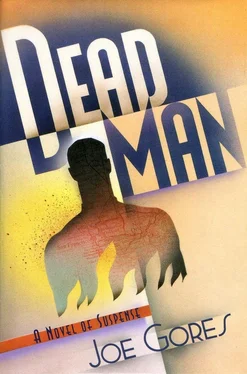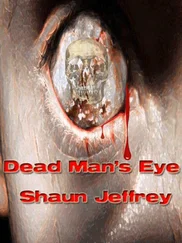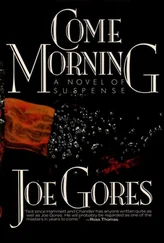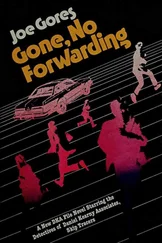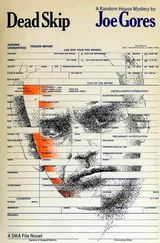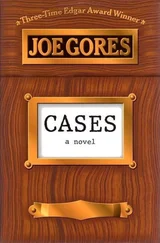In a gym area furnished with an Olympic bar set, racked dumbbells, benches, pulleys, rings and horses, mats, Dain selected two 70-pound dumbbells. He began doing warm-up cleans and presses with them. As his skin flushed with the added blood, the fishbelly scars stood out starkly.
Fifty minutes later, he settled into his usual chair across the desk from Sherman as the bookseller reached out a long arm to stab playback on the cassette recorder.
Sherman’s voice said, “Three-four-six-two.”
“I want to talk with Edgar Dain.”
“Mr. Dain is not available for phone calls.”
The other voice blustered. “Yeah, yeah, I know, but this is different. Very sensitive, large issues at—”
Dain cut the voice in midsentence by punching off.
“Midwest, maybe Chicago. Asshole, maybe an attorney.”
Sherman said, “Oh, well, that’s that, then. If the man is an attorney, Dain couldn’t possibly do any work for him.”
As their arrangement had blossomed, they had fallen into a professional relationship devoid of the personal. Dain executed the commissions he accepted through Sherman without discussing them or ever filing any written reports, facts Sherman found almost unbearably unprofessional.
“Attorneys lie a lot,” said Dain. “Always at the wrong time to the wrong people.”
Sherman began to prowl. He’d believed that being Dain’s go-between would be tweaking the tail of the tiger. Instead, the tiger stayed in its cage. He scooped up the invariable leather-bound book from the corner of the desk. The Tibetan Book of the Dead. He almost slammed it down again.
“Still drugging your mind with lunacies five years later.”
“It’s my mind.”
“And don’t give me any crap about physical therapy. You use it to remind yourself of...” He paused, fearing he had gone too far, but Dain did not react, so he asked, “So, what do I tell T. J. L. Maxton when he calls again?”
Dain raised his eyebrows. “That was Teddy Maxton?”
“You know him?”
“Of him. Chicago investment attorney who does occasional legal work for some minor mob figures.”
“You amaze me, Dain. Sometime I’d like to know what you were really doing during those four lost years.”
“Recuperating.”
“Where? In the Witness Relocation Program? You know more arcane facts about obscure organized-crime individuals than—”
Dain came to his feet in a single swift movement. “Maxton, huh? Let’s step on his tail, see if he squeals.”
Sherman felt the familiar delicious thrill of excitement.
“If Maxton’s really connected, is that wise?”
“Is living wise?” Dain countered as he stalked out with his Tibetan Book of the Dead under one arm.
Two days later, 7:30 A.M., Dain was at the World Gym in Kentfield near the College of Marin, doing a circuit workout that built cardiovascular capacity while strengthening the five major muscle groups. The few dedicated bodybuilders in the basement free weight room at that hour were too busy with their own workouts to pay any attention to Dain, as he in turn ignored the morning-long shadow that climbed across him.
“Dain? Edgar Dain?”
Dain was doing barbell curls with two hundred pounds, grunting with the effort. He finished, pouring sweat, the planes of his chest shifting under his black sweatshirt with each heaving breath.
He said rudely, “Outside in an hour.”
When Dain emerged, the man was waiting on the sidewalk in front of the gym, legs slightly apart and heavy features set in an angry scowl. He was a fleshy well-conditioned late- forties, five-nine, 190, with mean blue eyes and a stubborn jaw. Raymond Burr during his early career as movie villain, with something of Burr’s indefinable dynamism that held the eye. Dain figured he would make a lot of a certain kind of woman go weak in the knees.
“Theodore Maxton,” Dain nodded without offering a hand. “You’d make a good politician. Plenty of physical presence.”
“How the hell did you know who I—”
“I spotted your hired flunky following me around, followed him last night to the St. Francis. You’re in suite nine-oh-one.”
His car was parked in the lot of Taqueria de Marin, which didn’t open until eleven. Maxton had to trot or be left behind. Dain pressed WALK for the three-way light at College Ave.
Maxton said almost reasonably, “Don’t be so damn difficult, Dain. Everybody likes money. I want you to find James Zimmer for me — until a week ago he was a law clerk in my legal firm.”
The light changed. They crossed. Dain said, “How much did he steal, how, and from whom?”
“Who said anything about stealing? I just want him found.”
“How much did he steal, how, and from whom?”
Maxton snarled, “A client, Adelle Lorimer has — had — five million dollars’ worth of her late husband’s undeclared bearer bonds in her safe-deposit box. Mrs. Lorimer is on an extended tour of Europe, our firm has power of attorney, Zimmer was her attorney of record so he had access to the box. He extracted two million worth of the bonds, substituted forgeries, and disappeared. Since the money is undeclared, Mrs. Lorimer does not want publicity that would bring IRS scrutiny.”
Dain paused beside the ‘84 Toyota Corolla in which he had driven Marie and Albie to Point Reyes five years before.
“Why was a law clerk her attorney of record, and why did he think he could get away with the theft?”
“Mrs. Lorimer knew his parents. As for the theft, in the normal course of events, the bonds probably would have remained untouched in the box until Mrs. Lorimer’s death.”
Dain unlocked the car door. “I’ll be in touch,” he said as he slid into the car. “Or I won’t.”
“Hey, wait a goddamned...”
He stood in the deserted parking lot, glaring after Dain’s car and muttering curses under his breath. But Dain, driving away, already was considering which data bases would give him best access to T. J. L. Maxton’s affairs. About the fugitive Zimmer he thought not at all, except to wonder if Max-ton’s definition of drastic might include hiring a hitman for him. Perhaps a hitman who, years before...
That sort of slim chance was all Dain lived for.
Teddy Maxton’s office was in the penthouse of a new high rise with a good view of Sears Tower and the Chicago River snaking through the Loop. The office was expensive without distinction, relentlessly modern, reflecting a designer’s tastes rather than Maxton’s. The lawyer was on the phone with a client when the door was opened by Jeri Pearson, his thirtyish executive secretary. Maxton looked up, irritated.
“I told you no—”
“A Mr. Dain? He seemed to think—”
Maxton, mollified, made a beckoning gesture. It was after 4:00 P.M., so he had a drink at his elbow. He said into the phone, “Something’s come up, I’ll call you back tomorrow.”
Jeri ushered in Dain, shut the door as she left. Dain was dressed in a conservative business suit and a Sulka tie. In his left hand was his usual leather-bound book. He stopped in the middle of the room as Maxton moved his glass and raised an eyebrow, almost smirking to see him there after all.
Dain shook his head, wiped away Maxton’s self-satisfied look by saying, “I get ten percent of anything recovered against a twenty-five K guarantee. I cover my own expenses.”
“Ten percent! I told you he stole two million dollars. Ten percent is an absolutely outrageous—”
“My fee is not negotiable.”
Maxton came around the desk, his hands clenched and his face dark with anger. “Everyone’s fee is negotiable.”
Dain sat down in the visitor’s chair, laid his leather-bound book on the edge of the desk. After a moment, Maxton went back behind the desk to get his drink, jaw aggressive.
Читать дальше
